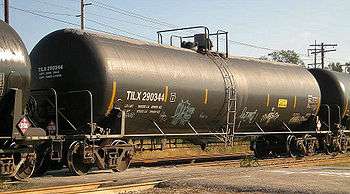Bulk cargo

Modern tank cars carry all types of liquid and gaseous commodities.
Bulk cargo is commodity cargo that is transported unpackaged in large quantities. It refers to material in either liquid or granular, particulate form, as a mass of relatively small solids, such as petroleum/crude oil, grain, coal, or gravel. This cargo is usually dropped or poured, with a spout or shovel bucket, into a bulk carrier ship's hold, railroad car/railway wagon, or tanker truck/trailer/semi-trailer body. Smaller quantities (still considered "bulk") can be boxed (or drummed) and palletised. Bulk cargo is classified as liquid or dry.
The Baltic Exchange is based in London and provides a range of indices benchmarking the cost of moving bulk commodities, dry and wet, along popular routes around the seas. Some of these indices are also used to settle Freight Futures, known as FFA's. The most famous of the Baltic indices is the Baltic Dry Indices, commonly called the BDI. This is a derived function of the Baltic Capesize index (BCI), Baltic Panamax index (BPI), Baltic Supramax index (BSI) and the Baltic Handysize index (BHSI). The BDI has been used as a bellwether for the global economy as it can be interpreted as an indicator of an increase or decrease in the amount of raw commodities countries are importing/exporting.
Dry bulk cargo ("dry" trades)[1]
- Bauxite
- Bulk minerals (sand & gravel, copper, limestone, salt, etc.)
- Cements
- Chemicals (fertilizer, plastic granules & pellets, resin powder, synthetic fiber, etc.)
- Coals and cokes
- Agricultural products such as dry edibles (for animals or humans: alfalfa pellets, citrus pellets, livestock feed, flour, peanuts, raw or refined sugar, seeds, starches, etc.)
- Grains (wheat, maize, rice, barley, oats, rye, sorghum, soybeans, etc.)
- Iron (ferrous & non-ferrous ores, ferroalloys, pig iron, scrap metal, pelletized taconite), etc.
- Wood chips
- Refrigerated goods
- Livestock and animal products
- Unitised goods
- Wheeled and heavy units
Liquid bulk cargo ("wet" trades)
Non edible and dangerous liquids
Gallery
Large ports specializing in bulk cargo
See also
Bibliography
References
- ↑ Dry Cargo Chartering. London: Institute of Chartered Shipbrokers. 2013. p. 38.



